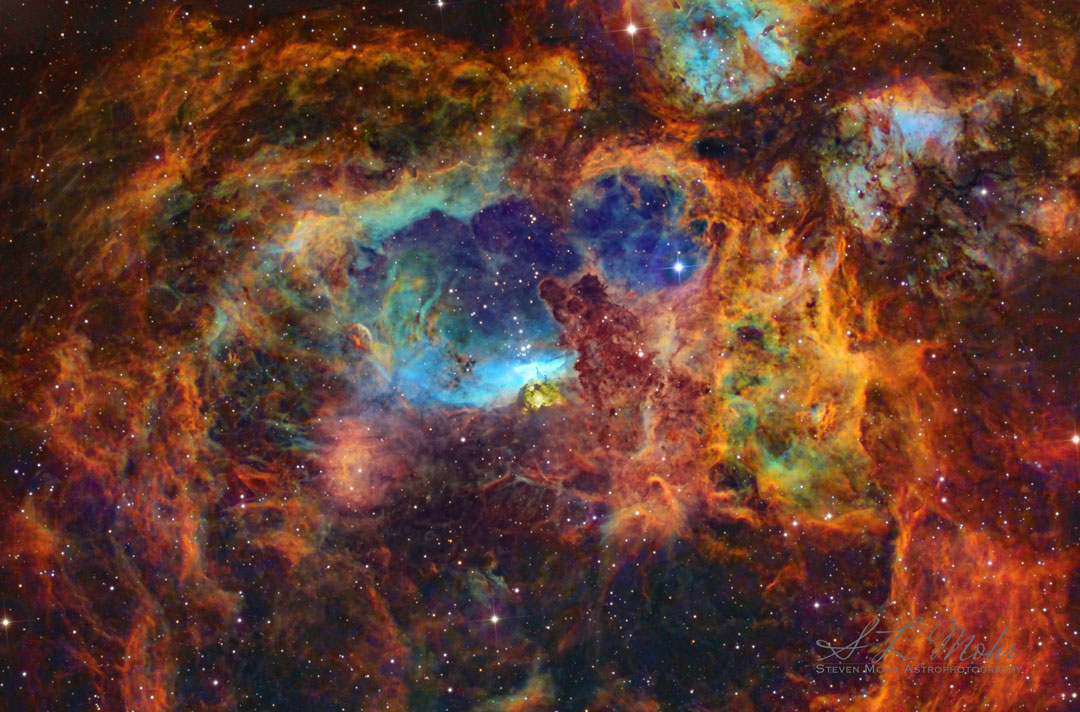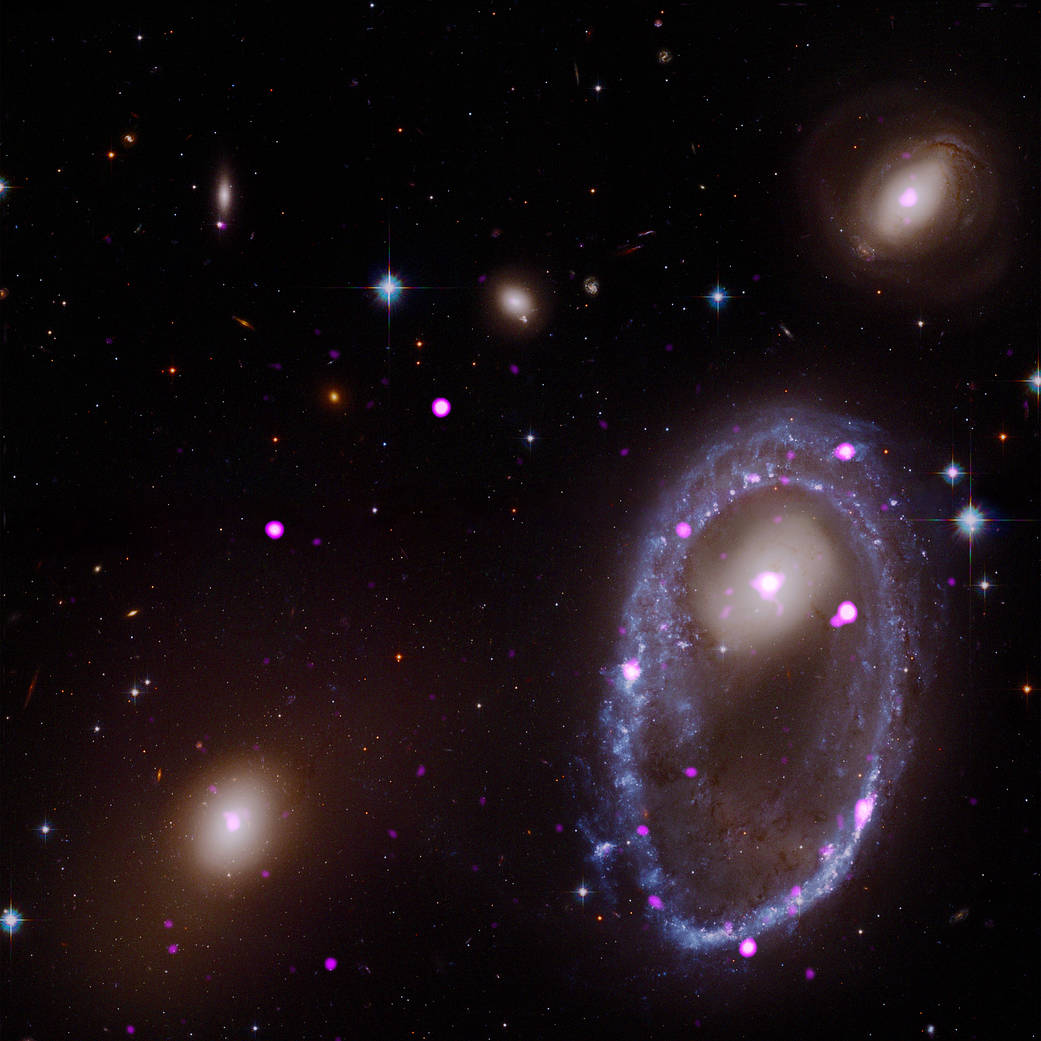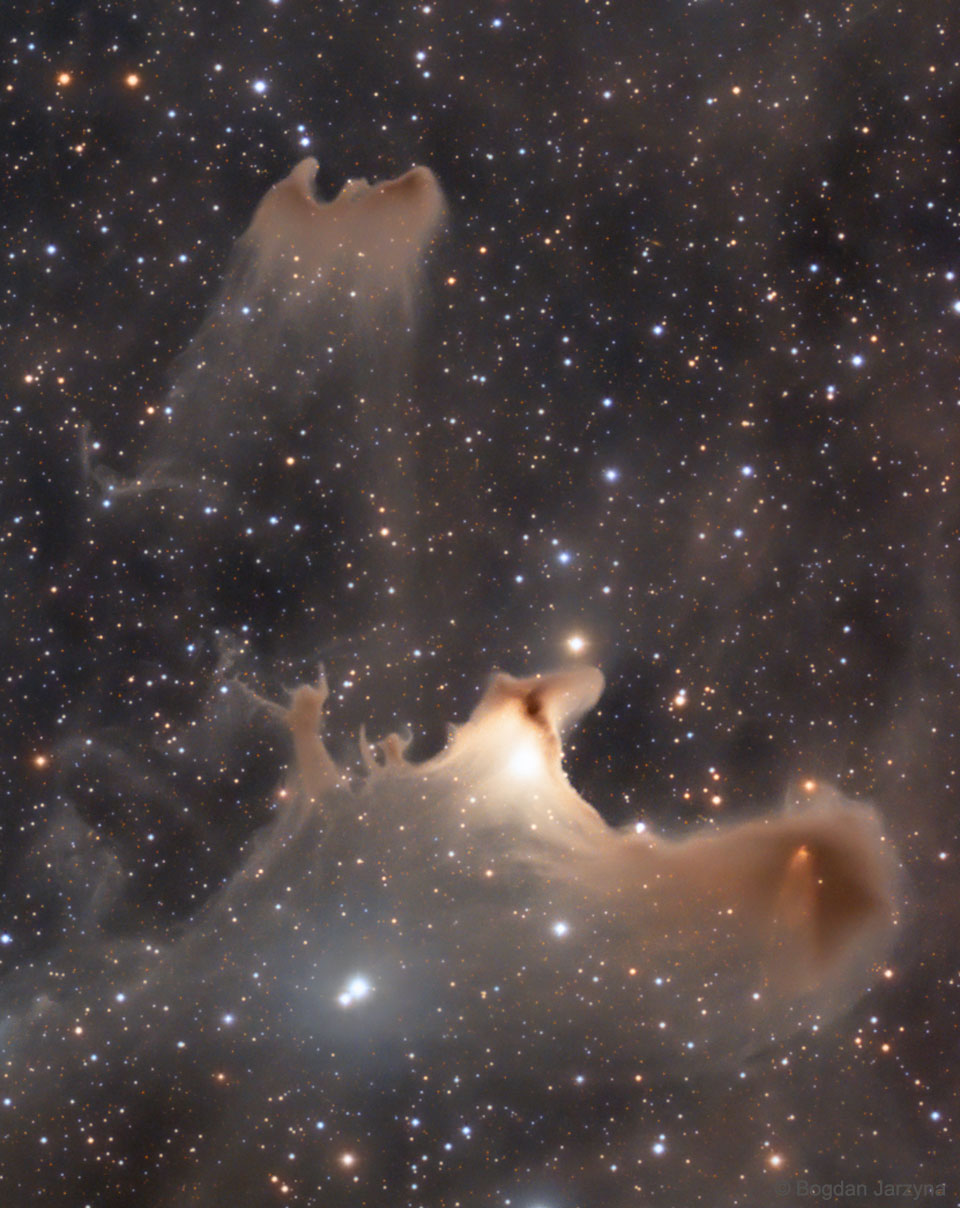Blog
Cataloged as NGC 6357, the Lobster Nebula houses the open star cluster Pismis 24 near its center — a home to unusually bright and massive stars. The overall blue glow near the inner star forming region results from the emission of ionized hydrogen gas. The surrounding nebula, featured here, holds a complex tapestry of gas, dark dust, stars still forming, and newly born stars. The intricate patterns are caused by complex interactions between interstellar winds, radiation pressures, magnetic fields, and gravity. NGC 6357 spans about 400 light years and lies about 8,000 light years away toward the constellation of the Scorpion.

Richard Bona (born 28 October 1967) is a Cameroon-born American musician, multi-instrumentalist and vocalist.
Bona Pinder Yayumayalolo was born in Minta, Cameroon, into a family of musicians, which enabled him to start learning music from a young age. His grandfather was a griot – a West African singer of praise and storyteller – and percussionist, as his mother was a singer. When he was four years old, Bona started to play the balafon. At the age of five, he began performing at his village church. Not being wealthy, Bona made many of his own instruments: including flutes and guitars (with cords strung over an old motorcycle tank).
His talent was quickly noticed, and he was often invited to perform at festivals and ceremonies. Bona began learning to play the guitar at the age of 11, and in 1980, aged just 13, he assembled his first ensemble for a French jazz club in Douala. The owner befriended him and helped him discover jazz music, in particular that of Jaco Pastorius, which inspired Bona to switch his focus to the electric bass.
more...Elton Dean (28 October 1945 – 8 February 2006) was an English jazz musician who performed on alto saxophone, saxello (a variant of the soprano saxophone) and occasionally keyboards.
Dean was born in Nottingham, England, moving to Tooting, London, soon after his birth. From 1966 to 1967, Dean was a member of the band Bluesology, led by Long John Baldry. The band’s pianist, Reginald Dwight, afterward combined Dean’s and Baldry’s first names for his own stage name, Elton John. This fact is noted in the 2019 film Rocketman, a biopic of the life and career of Elton John, where Dean is portrayed by Evan Walsh.
more...Glen Moore (born October 28, 1941 in Portland, Oregon) is a jazz bassist who occasionally performs on piano, flute and violin.
His performing career began at age 14 with the Young Oregonians in Portland, Oregon where he met and played with Native American saxophonist, Jim Pepper. He graduated with a degree in History and Literature from the University of Oregon. His formal bass instruction started after college with Jerome Magil in Portland, James Harnett in Seattle, Gary Karr in New York, Plough Christenson in Copenhagen, Ludwig Streicher in Vienna and Francois Rabbath in Hawaii. For the past 30 years, Glen has played a Klotz bass fiddle crafted in Tyrol circa 1715 on which he has made extensive use of a unique tuning with both a low and high C string.
Moore is a founding member of Oregon, but worked also regularly with Rabih Abou-Khalil, Vasant Rai, Nancy King and Larry Karush.
more...Charles Edward Daniels (October 28, 1936 – July 6, 2020) was an American singer, songwriter and multi-instrumentalist known for his contributions to Southern rock, country, and bluegrass music. He was best known for his number-one country hit “The Devil Went Down to Georgia“. Much of his output, including all but one of his eight Billboard Hot 100 charting singles, was credited to the Charlie Daniels Band.
Daniels was active as a singer and musician from the 1950s until his death. He was inducted into the Cheyenne Frontier Days Hall of Fame in 2002,[6]the Grand Ole Opry in 2008, the Musicians Hall of Fame and Museum in 2009, and the Country Music Hall of Fame in 2016. Daniels was born October 28, 1936, in Wilmington, North Carolina, and raised on a musical diet that included Pentecostal gospel, local bluegrass bands, and the rhythm & blues and country music from Nashville’s 50,000-watt AM radio stations WLAC and WSM.
more...https://www.youtube.com/watch?v=odKU3riZ3ZE
more...Astronomers have used NASA’s Chandra X-ray Observatory to discover a ring of black holes or neutron stars in a galaxy 300 million light years from Earth.
This ring, while not wielding power over Middle Earth, may help scientists better understand what happens when galaxies smash into one another in catastrophic impacts.
In this new composite image of the galaxy AM 0644-741 (AM 0644 for short), X-rays from Chandra (purple) have been combined with optical data from NASA’s Hubble Space Telescope (red, green, and blue). The Chandra data reveal the presence of very bright X-ray sources, most likely binary systems powered by either a stellar-mass black hole or neutron star, in a remarkable ring. The results are reported in a new paper led by Anna Wolter from INAF-Osservatorio Astronomico di Brera in Milano, Italy.
Where did the ring of black holes or neutron stars in AM 0644 come from? Astronomers think that it was created when one galaxy was pulled into another galaxy by the force of gravity. The first galaxy generated ripples in the gas of the second galaxy, AM 0644, located in the lower right. These ripples then produced an expanding ring of gas in AM 0644 that triggered the birth of new stars. The first galaxy is possibly the one located in the lower left of the image.
The most massive of these fledgling stars will lead short lives — in cosmic terms — of millions of years. After that, their nuclear fuel is spent and the stars explode as supernovas leaving behind either black holes with masses typically between about five to twenty times that of the Sun, or neutron stars with a mass approximately equal to that of the Sun.
Some of these black holes or neutron stars have close companion stars, and siphon gas from their stellar partner. This gas falls towards the black hole or neutron star, forming a spinning disk like water circling a drain, and becomes heated by friction. This superheated gas produces large amounts of X-rays that Chandra can detect.

more...
Philip Catherine (born 27 October 1942) is a Belgian jazz guitarist. Philip Catherine was born in London to an English mother and Belgian father and was raised in Brussels. His grandfather played violin in the London Symphony Orchestra. Catherine started on guitar in his teens, and by seventeen he was performing professionally at local venues.
He released his debut album, Stream, in 1972. During the next few years, he studied at Berklee College of Music in Boston and with Mick Goodrickand George Russell. In 1976, he and guitarist Larry Coryell recorded and toured as an acoustic duo. The following year he recorded with Charles Mingus, who dubbed him “Young Django”. In the early 1980s, he toured briefly with Benny Goodman. He was in trio with Didier Lockwood and Christian Escoudé, then in a trio with Chet Baker. During the 1990s, he recorded three albums with trumpeter Tom Harrell.
Catherine has also worked with Lou Bennett, Kenny Drew, Dexter Gordon, Stéphane Grappelli, Karin Krog, Paul Kuhn, Sylvain Luc, Michael Mantler, Charlie Mariano, Palle Mikkelborg, Niels-Henning Ørsted Pedersen, Enrico Rava, Toots Thielemans, and Miroslav Vitous.
more...George Wallington (October 27, 1924, – February 15, 1993) was an American jazz pianist and composer.
Wallington was born Giacinto Figlia (some sources give “Giorgio”) in Sicily, and then moved to the United States (New York) with his family in 1925. His father sang opera and introduced his son to classical music, but Wallington listened to jazz after hearing the music of saxophonist Lester Young. He said that he acquired the name Wallington in high school: “I like to wear flashy clothes […] and the kids in the neighborhood would say, ‘Hey, look at Wallington!'” He left school at the age of 15 to play piano in New York.
From 1943 to 1953 Wallington played with Dizzy Gillespie, Joe Marsala, Charlie Parker, Serge Chaloff, Allan Eager, Kai Winding, Terry Gibbs, Brew Moore, Al Cohn, Gerry Mulligan, Zoot Sims, and Red Rodney, and recorded as a leader for Savoy and Blue Note (1950). Wallington toured Europe in 1953 with Lionel Hampton‘s big band. In 1954-60 he led bands in New York that contained rising musicians including Donald Byrd, Jackie McLean, and Phil Woods.
From 1954 to 1960 he led groups in New York that included newcomers Donald Byrd, Jackie McLean, and Phil Woods, recording as leader with these musicians for the Prestige and Atlantic labels. A Blue Note septet session from 1954 George Wallington Showcase is not included in this discography.
more...Babs Gonzales (October 27, 1919 – January 23, 1980), born Lee Brown, was an American bebop vocalist, poet, and self-published author. His books portrayed the jazz world that many black musicians struggled in, portraying disk jockeys, club owners, liquor, drugs, and racism. “There are jazz people whose influence can be described as minor,” wrote Val Wilmer, “yet who are well-known to musicians and listeners alike … You’d have to be hard-pressed to ignore the wealth of legend that surrounds Babs Gonzales.” Jazz writer Jack Cooke explained that Gonzales “assumed the role of spokesman for the whole hipster world… [becoming] something more than just a good and original jazz entertainer: the incarnation of a whole social group.” Gonzales was born Lee Brown in Newark, New Jersey. He was raised solely by his mother Lottie Brown alongside two brothers. Of his nickname, Gonzales explained, “my brothers are basketball players… there was a basketball star in America named Big Babbiad, and so they were called Big Babs, Middle Babs, and I’m Little Babs.
more...The jeweled expanse, filled with faint, starlight-reflecting clouds, drifts through the night in the royal constellation of Cepheus. Far from your own neighborhood on planet Earth, these ghostly apparitions lurk along the plane of the Milky Way at the edge of the Cepheus Flare molecular cloud complex some 1,200 light-years away. Over two light-years across and brighter than the other spooky chimeras, VdB 141 or Sh2-136 is also known as the Ghost Nebula, seen at toward the bottom of the featured image. Within the reflection nebula are the telltale signs of dense cores collapsing in the early stages of star formation.

William Earl “Bootsy” Collins (born October 26, 1951) is an American musician, singer and songwriter.
Rising to prominence with James Brown in the early 1970s, and later with Parliament-Funkadelic, Collins’s driving bass guitar and humorous vocals established him as one of the leading names in funk. He is a member of the Rock and Roll Hall of Fame, inducted in 1997 with 15 other members of Parliament-Funkadelic. Collins was born in Cincinnati, Ohio, United States, on October 26, 1951. He said that his mother named him “Bootsy”. “I asked her why,” he explained to a journalist, “and she just said, ‘Because you looked like a Bootsy.’ I left it at that.”
His brother Phelps “Catfish” Collins (1943–2010) was also a musician. He and Bootsy were once part of James Brown’s backing band, The Pacemakers.
more...Milton Nascimento (Portuguese pronunciation: [‘miwtõ nasiˈmẽtu]; born October 26, 1942) is a prominent Brazilian singer-songwriter and guitarist.
Milton Nascimento was born in Rio de Janeiro. His mother, Maria Nascimento, was a maid. As a baby, Nascimento was adopted by a couple who were his mother’s former employers; Josino Brito Campos, a bank employee, mathematics teacher and electronic technician and Lília Silva Campos, a music teacher and choir singer. When he was 18 months old, Nascimento’s biological mother died, and he moved with his adoptive parents to the city of Três Pontas, in the state of Minas Gerais.
Nascimento was an occasional DJ on a radio station that his father once ran. He lived in the boroughs of Laranjeiras and Tijuca in Rio de Janeiro.
In the early stages of his career, Nascimento played in two samba groups, Evolussamba and Sambacana. In 1963, he moved to Belo Horizonte, where his friendship with Lô Borges led to the Clube da Esquina (“street corner club”) movement. Members included Beto Guedes, Toninho Horta, Wagner Tiso, and Flávio Venturini, with whom he shared compositions and melodies. One composition was “Canção do Sal”, which was first interpreted by singer Elis Regina in 1966 and led to a television appearance with Nascimento. The collective, as well as some others, released Clube da Esquina in 1972. Several hit singles were also released.
https://www.youtube.com/watch?v=kZNdbBYLliE
more...Edward Jackson Henderson (born October 26, 1940) is an American jazz trumpet and flugelhorn player. He came to prominence in the early 1970s as a member of pianist Herbie Hancock‘s band, going on to lead his own electric/fusion groups through the decade. Henderson earned his medical degree and worked a parallel career as a psychiatrist and musician, turning back to acoustic jazz by the 1990s.
Henderson’s influences include Booker Little, Clifford Brown, Woody Shaw, and Miles Davis.
Henderson’s mother was one of the dancers in the original Cotton Club. She had a twin sister, and they were called The Brown Twins. They would dance with Bill “Bojangles” Robinson and the Nicholas Brothers. In the film showing Fats Waller playing “Ain’t Misbehavin'”, Henderson’s mother sat on the piano whilst Waller sang to her. His father sang with Billy Williams and The Charioteers, a popular singing group.
more...More Posts
- Rhonda Scott Day
- Music for Surviving the Pandemic and Realizing Racial Justice
- The Cosmos with LDN 1251
- Dr Lonnie Smith Day
- John Heard Day
- Johnny Coles Day
- Flamenco Fridays with Juan Varea y Luis Habichuela
- Daily Roots with Buju Banton
- Music for Surviving the Pandemic and Realizing Racial Justice
- The Cosmos with DEM L316
- Charlie Watts Day
- Ahmal Jamal Day
- Milwaukee Slim Day
- World Music with Damir Imamović
- Daily Roots with Mikey Spice
- FIRE EXTINGUISHER ALERT
- Music for Surviving the Pandemic and Realizing Racial Justice
- The Cosmos with NGC 2835
- Leon “Ndugu” Chancler Day
- Rashied Ali Day